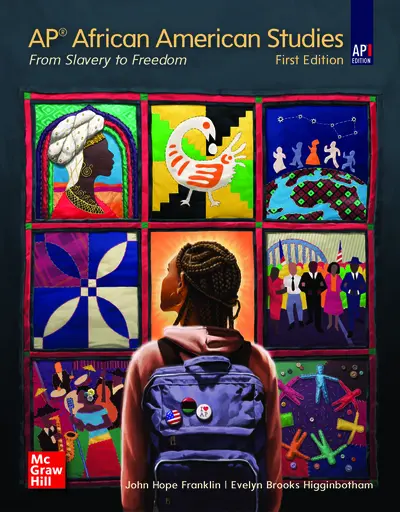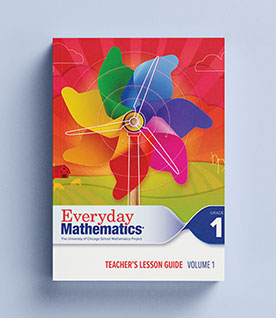My Account Details

AP African American Studies: From Slavery to Freedom, 1e, ©2026, Franklin
Grades: 9 - 12
The first edition of AP African American Studies: From Slavery to Freedom builds upon the vast historical and current scholarship of the most revered chronology of the African American experience. This AP Edition is fully aligned with the College Board Framework; provides complete coverage of the source-based course content, themes, and skills; and meticulously matches the course's chrono-thematic structure.
Program Details
This first edition of AP African American Studies: From Slavery to Freedom builds upon the vast historical and current scholarship of the most revered chronology of the African American experience. This AP Edition provides complete coverage of the source-based course content, themes, and skills, and meticulously matches the course's chrono-thematic structure. Beginning with, “What is African American Studies?” that covers the history of the field of study and its major researchers and authors, the program takes a multi-disciplinary approach that helps students grasp the key concepts, developments, and processes enabling them to understand diverse perspectives surrounding historical events and debates. Co-author, Dr. Evelyn Brooks Higginbotham, served on the AP course development committee and the College Board chose the parent text as the foundation for the course. This AP Edition is in lock-step alignment with the Framework.
Incomparable Support for AP Success
- Mastering AP Skills: Special features provide explicit instruction and practice for skills including content application, source analysis, and argumentation.
- Analyzing Primary Sources: An abundance of primary visuals and texts, including "Window in Time Source Analysis" provide opportunities to engage directly with sources to build essential analytical skills.
- Source-Based Skills Practice: Targeted guidance on applying these crucial skills use sample questions that mirror the format and complexity of the AP Exam.
- Robust Digital Resources: An interactive eBook, adaptive SmartBook®, Actively Learn, and two complete AP Practice Exams, provide additional support and practice opportunities.
- Exceptional Teacher Support: Print and digital resources include a Teacher Manual, pacing guides and strategies for teaching, activities, resources for source analysis, navigating sensitive subject areas, and offers support for teachers who are new to the discipline or the AP program.
Introduction What is African American Studies?
Unit 1 Origins of the African Diaspora
- Chapter 1 Ancestral Africa
- Chapter 2 The Great Empires and Other States
Unit 2 Freedom, Enslavement, and Resistance
- Chapter 3 Africans in the Atlantic World
- Chapter 4 Establishing North American Slavery
- Chapter 5 Eighteenth-Century Enslaved Societies
- Chapter 6 Give Me Liberty
- Chapter 7 Building Communities in the Early Republic
- Chapter 8 Southern Slavery
- Chapter 9 Antebellum Free Blacks
- Chapter 10 Abolitionism in Black and White
- Chapter 11 Civil War
Unit 3 The Practice of Freedom
- Chapter 12 Promises and Pitfalls of Reconstruction
- Chapter 13 The Color Line
- Chapter 14 The Era of Self-Help
- Chapter 15 In Pursuit of Democracy
- Chapter 16 Voices of Protest
- Chapter 17 The Arts at Home and Abroad
- Chapter 18 The New Deal Era
Unit 4 Movements and Debates
- Chapter 19 Double V for Victory
- Chapter 20 American Dilemmas
- Chapter 21 We Shall Overcome
- Chapter 22 Black Power
- Chapter 23 Progress and Poverty
- Chapter 24 Shifting Terrains in the New Century
- Chapter 25 Continuing the Struggle
John Hope Franklin
John Hope Franklin was the James B. Duke Professor Emeritus of History, and for seven years he was Professor of Legal History at Duke University Law School. A native of Oklahoma and a graduate of Fisk University (1935), he received the A.M. and Ph.D. degrees in History from Harvard University (1936 and 1941). He taught at a number of institutions, including Fisk, St. Augustine’s College, and Howard University. In 1956 he went to Brooklyn College as Chair of the Department of History, and in 1964, he joined the faculty of the University of Chicago, serving as Chair of the Department of History from 1967 to 1970. At Chicago, he was the John Matthews Manly Distinguished Service Professor from 1969 to 1982, when he became Professor Emeritus. Among his many published works are The Free Negro in North Carolina (1943), Reconstruction after the Civil War (1961), A Southern Odyssey (1971), and perhaps his best-known book, From Slavery to Freedom: A History of African Americans, now in its tenth edition. In 1990 a collection of essays covering a teaching and writing career of fifty years was published as Race and History: Selected Essays, 1938–1988. In 2005, he published his autobiography, Mirror to America. During his long career, Dr. Franklin was active in numerous professional and educational organizations. For many years he served on the editorial board of the Journal of Negro History. He also served as president of the following organizations: The Southern Historical Association, the United Chapters of Phi Beta Kappa, the Organization of American Historians, and the American Historical Association. Dr. Franklin served on many national commissions and delegations, including the National Council on the Humanities, the President’s Advisory Commission on Ambassadorial Appointments, and the United States delegation to the 21st General Conference of UNESCO. He was appointed by President Bill Clinton to chair the President’s Advisory Board for the One America initiative in June 1997. He was the recipient of many honors. In 1978 Who’s Who in America selected him as one of eight Americans who have made significant contributions to society. In 1995 he received the first W.E.B. DuBois Award from the Fisk University Alumni Association, the Organization of American Historians’ Award for Outstanding Achievement, the NAACP’s Spingarn medal. In the same year President Clinton conferred on Franklin the Presidential Medal of Freedom, the nation’s highest civilian medal. In addition to his many awards, Dr. Franklin received honorary degrees from more than one hundred colleges and universities. John Hope Franklin died on March 25, 2009, at the age of 94 years.
Evelyn Brooks Higginbotham
Evelyn Brooks Higginbotham is the Victor S. Thomas Professor of History and of African and African American Studies at Harvard University. The first African American to chair the Department of History at Harvard University, she served in this position from 2018 to 2020. She chaired Harvard’s Department of African and African American Studies from 2006 to
2013. Professor Higginbotham earned a Ph.D. from the University of Rochester in History, an M.A. from Howard University, and B.A. from the University of Wisconsin–Milwaukee. Before going to graduate school, however, she began her teaching career in the public secondary schools of Milwaukee, Wisconsin and Washington, DC. Prior to joining the Harvard faculty in 1993, Professor Higginbotham taught in the Department of History at the University of Pennsylvania. Through her long career, she has also been a member of the faculties of the University of Maryland and earlier Dartmouth College. In 2010–2011, she was a visiting professor at the Duke University Law School and had the distinction of being its inaugural John Hope Franklin Professor of American Legal History. Professor Higginbotham’s writings span diverse fields—African American religious history, women’s history, civil rights, constructions of racial and gender identity, Black women in electoral politics, and photographs as sources of history. She is the author of the prizewinning book Righteous Discontent: The Women’s Movement in the Black Baptist Church, 1880–1920 (1993), for which she is especially recognized for conceptualizing “the politics of respectability.” The book was included among The New York Times Book Review’s Notable Books of the Year in 1993 and 1994. She is the co-editor with Henry Louis Gates, Jr., of the multivolume reference work African American National Biography (2008, 2012). As co-author with John Hope Franklin, she thoroughly revised and updated From Slavery to Freedom in her writing of the ninth and tenth editions and now the book’s 2026 release. Professor Higginbotham has received honorary degrees and numerous other honors and awards, most notable of which is the National Humanities Medal presented to her by President Barack Obama at the White House in 2015. She was elected to membership in the American Philosophical Society and the American Academy of Arts and Sciences— the nation’s oldest learned societies. In 2008 she received the Carter G. Woodson Scholars Medallion from the Association for the Study of African American Life and the Legend Award from the National Urban League. In 2020 she was honored with the Preservation and History Award from the New England Historic Genealogical Society. In January 2024 the American Historical Association honored her lifetime of achievement with its prestigious Award for Scholarly Distinction.
AP Contributors
Greg Simmons
For 17 years, Greg Simmons was a National Board Certified Teacher (NBCT) of social studies and English in Illinois and Missouri. Currently, he is completing his Ph.D. in social studies education at the University at Buffalo (SUNY) where he is also a fellow at the Center for K-12 Black History & Racial Literacy Education. He has taught collegiately at the University of Missouri, SUNY Oswego, SUNY Geneseo, and the University at Buffalo. He has presented his research at numerous national conferences on the teaching and learning of Black history, racial literacies, whiteness in teacher education, and critical pedagogy.
Marsha Greco
Marsha Greco is a National Board Certified Teacher in Social Studies-History who has been teaching in San Diego, California since 2009. She began teaching AP courses in 2014 and has taught AP African American Studies since its pilot launch in 2022. As a College Board-endorsed workshop consultant for AP African American Studies, she has trained and mentored teachers nationwide. Additionally, Marsha contributed to the development of assessment materials and AP Daily resources for AP African American Studies on the College Board’s AP Classroom platform. She has also presented curricula at numerous conferences such as the National Council for the Social Studies Conference, the California Council for the Social Studies Conference, and the Teaching Black History Conference. In 2024, she was named Outstanding High School Teacher of the Year by the California Council for the Social Studies.
Malcolm Reed
Malcolm Reed is a Certified Teacher in Social Studies-History who has been teaching African American Studies in the Baton Rouge Metropolitan area in Louisiana since 2015. He created his own African American Studies curriculum at McKinley High School, the first school in Louisiana for Black students, before moving to his current job at St. Amant High. Malcolm was one of the original 63 teachers nationwide and only three in the state of Louisiana that taught AP African American Studies in Pilot Year 1 (2022-2023) and was selected to be part of the first cohort of College Board-endorsed AP African American Studies Workshop Consultants in 2023 to train teachers in Pilot Year 2 and beyond. Throughout the 2023-2024 school year, Malcolm provided support to Pilot Year 2 teachers as a co-facilitator of monthly Office Hour sessions and a leader for extra support sessions hosted by the College Board. Malcolm also served as a Reader scoring Projects at the inaugural AP African American Studies Exam Reading for the pilot exam in 2023.
Michelle Rich
Michelle Rich began teaching Social Studies in Chicago Public Schools in 2006 and currently teaches at East High School in Denver, Colorado. She is a National Board Certified Teacher and recently earned a master’s degree in history with an emphasis on race and ethnicity from the University of Colorado Denver. She teaches AP Seminar with a focus on African Diaspora content and concurrent enrollment Introduction to Ethnic Studies through the University of Colorado Denver. In addition to her classroom work, Michelle has collaborated with the African Diaspora Consortium on several conferences and has served as an AP Reader for both AP United States History and AP Seminar.
MarQuitta Sutton Adams
MarQuitta Sutton Adams is a National Board Certified Teacher and Los Angeles native, with 13 years of teaching experience at Title 1 schools. She is currently teaching AP African American Studies and AP English Literature and Composition at Locke College Prep Academy in the heart of South Los Angeles, California. She has a wealth of experience in developing a rigorous yet culturally relevant AP course for diverse groups of students. MarQuitta was one of the 63 teachers in the US to teach AP African American Studies in Pilot Year 1 and is now a College Board-endorsed workshop consultant for the course. Most importantly, she is a proud mom, wife, and excited to be a contributor to the revised textbook.















































Social Studies
View all Social Studies Programs
IMPACT (K–5)
Actively Learn (3–12)
New Social Studies (6–12)
Networks (6–12)